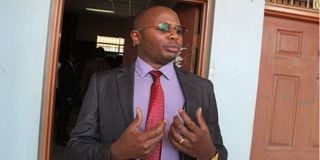Premium
LSK sued over suspended council

Lawyer Adrian Kamotho speaks to journalists outside the High Court in Nairobi on a separate case last February. He has taken the LSK to court challenging its decision to suspend all council members.
What you need to know:
- Mr Kamotho says LSK regulations on SGM require that a notice of intention to propose a special resolution must be given at least 21 days before the date proposed for the resolution.
- But in Monday’s meeting, members were only given a 12-day notice.
A Nairobi lawyer has moved to court to challenge Monday’s resolutions by the Law Society of Kenya (LSK) suspending all its council members.
Mr Adrian Kamotho filed the case under a certificate of urgency on Wednesday, asking the High Court to suspend all the resolutions passed during the chaotic meeting on Monday.
He argues that the case is urgent as the status and operations of the LSK are in an indeterminate state with the whole council, which is the governing body, on suspension.
“The kangaroo fashion in which (LSK president Nelson Havi) presided over the impugned meeting severely exposes the whole legal profession to public mockery, ridicule and disdain,” he says.
He adds that, once the public loses their respect for lawyers, respect for the rule of law will correspondingly diminish, paving the way for anarchy. He said, under section 12 of the Law Society of Kenya Act, every member has a right to vote on any matter pertaining to the LSK.
No vote, he adds, was taken in the manner provided for under the society’s laws, hence all the resolutions from the SGM are a nullity.
Mr Kamotho says LSK regulations on SGM require that a notice of intention to propose a special resolution must be given at least 21 days before the date proposed for the resolution.
Special resolution
But in Monday’s meeting, members were only given a 12-day notice. He says the LSK laws also depicts a “special resolution” must be passed by not less than two-thirds of members present.
“The motion purportedly used to suspend the (council members) was never put to the vote and therefore the mandatory two-thirds approval required for the resolution was never realised,” he argues.
When the meeting was called, about 300 members were physically present at the offices while the rest participated virtually.
Mr Kamotho points out that, throughout the meeting, Mr Havi remained singularly focused on the few members who were physically present while the virtual attendees were systematically denied audience.
“Given the manifest inclination to thuggery, mindless disorder and rowdiness, a significant number of those physically present at the meeting were not advocates, but hired goons with a clear brief to gag any voice alternative to that of their master,” he says.
He accuses Mr Havi of including in the agenda matters that were not legally admissible nor listed in the notice convening the SGM.





